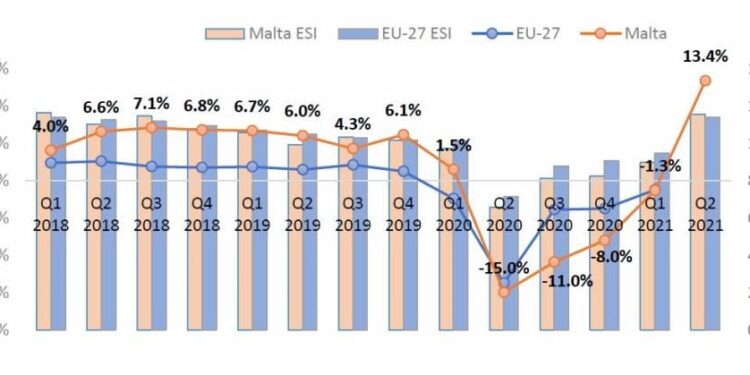Malta’s economy is demonstrating robust growth coupled with notable fiscal improvements, according to a recent report by Fitch Ratings. The credit agency highlighted the island nation’s resilient economic performance, driven by key sectors such as tourism, financial services, and technology. This positive outlook underscores Malta’s strengthening fiscal position and growing investor confidence, positioning the country for sustained economic stability in the near term.
Malta’s Economic Expansion Driven by Robust Tourism and Financial Services
Malta’s recent economic surge is significantly attributed to its thriving tourism sector, which continues to rebound strongly following pandemic-induced setbacks. The influx of international visitors has boosted revenue across hospitality, entertainment, and retail industries, underscoring the island’s appeal as a Mediterranean destination. Alongside tourism, the financial services industry has maintained robust growth, fueled by regulatory reforms and increased investment inflows. This dual momentum has not only enhanced GDP figures but also improved fiscal stability and employment rates.
Key contributors to the upward trajectory include:
- Rising tourist arrivals: A consistent year-on-year increase in visitor numbers from Europe and beyond.
- Financial sector diversification: Expansion in fintech, insurance, and corporate banking services.
- Government incentives: Strategic policies promoting foreign direct investment and start-up innovation.
| Sector | Growth Rate (2023) | Contribution to GDP (%) |
|---|---|---|
| Tourism | 8.7% | 20.5% |
| Financial Services | 7.2% | 15.3% |
| Overall Economy | 5.6% | 100% |
Fiscal Reforms Fuel Investor Confidence and Boost Credit Ratings
Malta’s proactive approach to enhancing fiscal discipline has significantly strengthened market perceptions, resulting in elevated investor confidence. Key measures such as improving public debt management, implementing prudent budgetary policies, and fostering transparency have collectively contributed to a more robust economic environment. This fiscal vigilance has not only contained fiscal deficits but has also led to increased liquidity and stability within financial markets, positioning Malta as an attractive destination for both local and international investors.
These efforts have not gone unnoticed by credit rating agencies. Fitch Ratings recently upgraded Malta’s sovereign credit rating, highlighting the government’s commitment to maintaining sustainable fiscal policies. The agency noted several drivers behind this positive outlook:
- Reduction in public debt ratio over the past three fiscal years
- Consistent budget surpluses aiding in debt amortization
- Stable economic growth supported by diversified sectors
- Improved fiscal governance and transparency practices
| Fiscal Metric | 2019 | 2021 | 2023 (Est.) |
|---|---|---|---|
| Public Debt to GDP | 46% | 40% | 35% |
| Budget Balance | -1.8% | 1.2% | 2.5% |
| Credit Rating | BBB+ | A- | A |
Experts Recommend Continued Policy Focus on Diversification and Sustainable Growth
Leading economists emphasize that Malta’s robust economic performance should not lead to complacency. To sustain long-term growth, diversification of key sectors remains critical, particularly in areas such as technology, financial services, and renewable energy. Experts point out that relying on a narrow range of industries could expose the economy to external shocks, especially in an increasingly volatile global market. Strategic investments in innovation and talent development are seen as pillars for maintaining Malta’s competitive edge regionally and beyond.
Furthermore, sustainability is now a non-negotiable aspect of any developmental agenda. Authorities and policymakers are encouraged to integrate environmental considerations into economic planning frameworks, promoting green infrastructure and energy-efficient initiatives. Below is a summary of expert-recommended focus areas moving forward:
- Expansion into emerging sectors: Cybersecurity, fintech, and biotech
- Enhancement of workforce skills: Continuous upskilling and education reform
- Promotion of green finance: Incentives for sustainable business practices
- Infrastructure modernization: Digital and transportation upgrades to support growth
| Focus Area | Expected Impact |
|---|---|
| Sector Diversification | Reduced vulnerability to external shocks |
| Green Initiatives | Lower carbon footprint and sustainable resource use |
| Skill Development | Increased productivity and innovation |
| Infrastructure | Improved efficiency and connectivity |
In Summary
As Malta’s economy continues to demonstrate robust growth alongside notable fiscal improvements, credit rating agency Fitch’s positive assessment underscores the island nation’s strengthened economic fundamentals. Moving forward, sustained policy efforts and strategic investments will be critical to maintaining this upward momentum and ensuring long-term fiscal stability. Investors and policymakers alike will be watching closely as Malta navigates its path toward continued economic resilience.
















